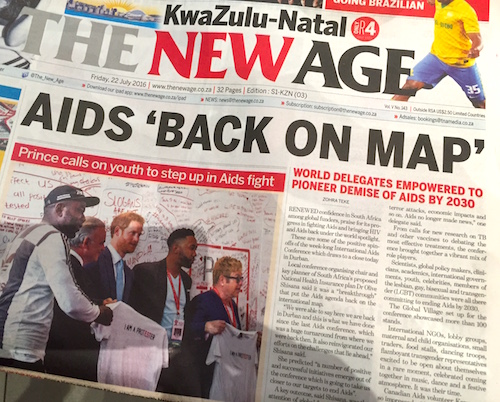July 22, 2016
It’s the end of the week and the last of the Durban diary entries from the AVAC team. Bags are bursting with materials, goodbyes are rushed and coffee is extra strong after a long and sleep-deprived week. As AIDS 2016 draws to a close we reflect on the week and reimagine a new way forward.
Reflecting on the New
At AIDS 2016 we found ourselves in a new zone—the Research Literacy Networking Zone, to be specific. AVAC and partners, IRMA, NHVMAS, TAG, WACI Health and WRHI, were on their feet for five days distributing materials, running sessions, playing educational games, and most importantly, translate lots of questions about HIV research into understandable language. Everyone came to the Zone, including Nobel Laureate Françoise Barré-Sinoussi and Emilio Emini, the Director of HIV at The Bill and Melinda Gates Foundation, and a steady stream of conference goers and Durban community members. Next week look out for a full update with a montage of what we saw and heard at the Zone!
Reflecting on the Community Voices
The Truth Booth, an impromptu recording studio booth at the Global Village, and the What’sUpHIV blog amplified the voices of diverse delegates who took on a range of vital issues. At the top of the list; a global effort to defeat HIV should be grounded in perspectives offered by affected communities, key populations, young people, girls and young women—but these perspectives are woefully neglected. We heard from these missing voices, about the barriers they confront, and the role of activism as the conference returned to Durban.
Hear the voices from the Truth Booth.
Read news and opinions from advocates and journalists at What’sUpHIV including:
- AVAC Fellow Ntombozuko Kraai’s question about community on who is community and who speaks for community
- AVAC Fellow Lepheana Mosooane’s thoughts on big targets, corruption and reaching the people who need interventions
Dispatches from Durban
If you missed any of our updates from the week, check them out below!
- Respect the Data, Respect the People: Day 5 at AIDS 2016
- I Bleed, I Rise: Day 4 at AIDS 2016
- The Vagina Dialogues: Day 3 at AIDS 2016
- Long Waits and Long Queues: Hurry Up! — Day 2 at AIDS 2016
- Magical Thinking and Surge Pricing: AIDS 2016 update—Day 1
Rest and Reimagine
We think of Durban 2000 as a watershed, but the conference was only the beginning. It was the action that came next that made all the difference.

After all the presentations, talking, and advocating, success depends less on a few days in Durban and more on a reimagined AIDS response—one that brings urgency to the major gaps in treatment, prevention, funding and human rights that we’ve just explored in so much depth for a few concentrated days in Durban. So rest up. We’ve got lots of work to do.